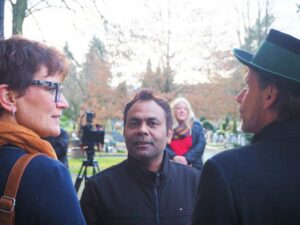Delhi to become the first state in India to prepare ward-level environment action plans
5 min read
New Delhi, March 8, 2022: The Kejriwal Government has been taking several steps to improve the air quality of Delhi. Greening initiatives have come up as an important mechanism to address the air pollution issue in the past, and this has led to the green cover per person to be the highest in Delhi as compared to other major cities in the country. Environment Minister Gopal Rai informed that the Government will organize a round-table conference on 25 April 2022, which will be attended by government functionaries from Pusa Institute, research organisations, and experts in the field, following which the Urban Farming initiative will be launched on-ground. He further stated — Delhi will become the first state in India to prepare ward-level environment action plans. Delhiites will be able to reduce the excessive consumption of chemical products in their everyday life and improve health through urban farming. Ms Reena Gupta, Advisor to the environment minister said that this initiative will play a critical role in transforming the urban landscape of Delhi from a concrete-first to a greening-first landscape.
Environment Minister Gopal Rai said, “The Kejriwal Government is making exceptional efforts towards environment conservation. Under this, tree plantation drives to increase Delhi’s green cover is a formidable task, which achieves the interim solution of keeping the pollution levels relatively low. Today, through the medium of the plantation drives, we have been able to bring Delhi to the top of the table in terms of per capita forest cover out of all major cities in the country. The green belt standard which is required in Delhi has been surpassed by 3.06%, but to tackle the trend of increase in vehicular and dust pollution levels especially during winters in Delhi, the state government is dedicated to accelerating the expansion of this green belt. The urban areas in Delhi are growing crowded, with a shift from farms and greenery to concrete houses, noise, and higher population density. In such a situation, Delhi is bound to face shortage of space when it comes to future plantation drives.”
He continued, “Keeping these probable conditions in mind, the Delhi Government is preparing a mega plan on urban farming. The concept of this plan is to encourage and enable everyone in Delhi to be capable of planting everyday fruits, vegetables, and other necessities in their own homes. The public in Delhi will be able to reduce the excessive consumption of chemical products in their everyday life, thereby improving their health. For this, the people in Delhi who have terraces, verandahs with access to sunlight, can begin urban farming in their homes and help meet their needs on a day-to-day basis, all while contributing to improving and preserving the environment of their city.”
He further said, “We have taken a major decision today regarding the urban farming mega plan – the Horticulture Department will be the nodal point for this initiative. We held a meeting with the concerned officers and concluded that on 25th April, an Urban Planning Roundtable Conference will be organised for the mega plan which the Delhi Government is planning to launch. This method is being used in different cities of the country, as well as the world – a discussion on how to implement these techniques throughout Delhi will take place through this conference. Along with members from the government department, the Pusa Institute and other experts, agencies and experts will be present at the conference which will be held at the Delhi Secretariat. Commencing our urban farming mega plan, we will brainstorm its implementation in Delhi at this conference.”
He added, “For this purpose, a primary proposal on two factors will be developed. First, with the help of the Pusa institute we will train people throughout Delhi. We are targeting people on a ward-by-ward basis, counting all wards under MCD, NDMC, Cantt Board, there are 300 wards in Delhi. A centralised training program will be initiated through master trainers and then they will further chain the rest of the population. Second, the whole initiative will run with the support of awareness campaigns on the lines of the winter action plan inculcating RWA, market associations and NGOs in the prospect. To train people, create awareness and make people join the urban farming revolution, we have proposed the establishment of the Delhi Environment Protection Committee. This committee will consist of people from various NGOs, RWAs, MLA-Councillor representatives, and environment enthusiasts. This will help us make urban farming a mass movement with the public playing a crucial role in it.”
He continued, “We understand that once people start urban farming they’ll need to procure material like seeds, bags, soil, equipment as well as training. For this purpose, we will create a panel from where the required inventory can be procured. They’ll just need to make one phone call and get all their needs fulfilled from there. I believe this project will help bridge an emotional connection among the people towards their environment. They’ll feel more attached to their surroundings, just by making an effort to grow plants. We aim to motivate our younger generation to this project to make them more attached to mother nature.”
Reena Gupta, Advisor to Environment Minister said, “this is the first time that any government is making decentralized environment action plans at ward level. This would have a transformational impact on Delhi Environment when citizens would be involved in planning, implementation & monitoring of ward level environment action plans. This initiative will play a critical role in transforming the urban landscape of Delhi from a concrete-first to a greening-first landscape. We invite all citizens to join hands and collaborate with the Government for this.”
What is urban farming?
Under Urban Farming, residents can grow fruits, vegetables, and plants on their terraces if there is enough sunlight available. Urban farming would help citizens in avoiding pesticides and harmful chemicals in the food products that they consume on a day-to-day basis, while also increasing the green cover in the city. The Horticulture Department would take on the responsibility of being the nodal point for the initiative..





